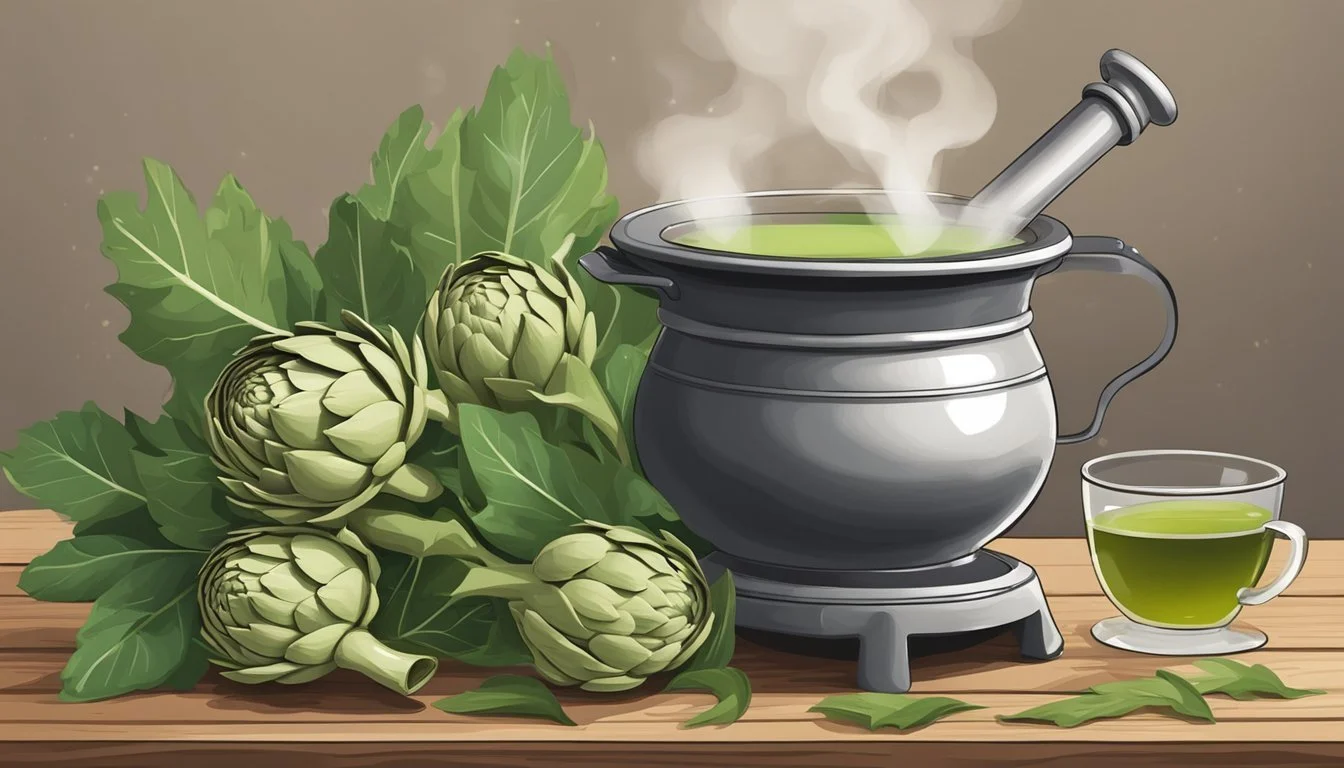Artichoke Leaf Tea
A Detoxifying Herbal Beverage Unveiled
Artichoke leaf tea, derived from the leaves of the artichoke plant, is steeped in historical use and is now gaining popularity as a detoxifying herbal beverage. Boiling the artichoke leaves in water extracts a host of beneficial compounds, including vitamins, minerals, and antioxidants. These phytonutrients contribute to the tea's health-promoting properties, including its potential to aid in digestive health and liver function.
Not only is artichoke leaf tea appreciated for its health benefits, but it is also consumed for its unique, mildly sweet taste. The artichoke is a perennial thistle originating from regions around the Mediterranean and has a long history of use in traditional remedies. Its leaves contain cynarine, a compound believed to stimulate bile production and promote healthy digestion, making the beverage an excellent choice for those looking to support their body’s natural detoxification processes.
What is Artichoke Leaf Tea?
Artichoke leaf tea is an herbal tea made from the leaves of the globe artichoke, Cynara scolymus. It's distinct from the more commonly consumed artichoke hearts and is caffeine-free, offering a unique alternative to traditional teas.
Characteristics:
Flavor: It tends to have a mild, slightly sweet taste, contrasting with the bitterness often associated with the artichoke's edible parts.
Color: The infusion produces a light green hue.
Preparation: Dried artichoke leaves are steeped in hot water to make the tea.
Composition:
Nutrients: Artichoke leaves are known for their antioxidant properties, which can contribute to the detoxification process in the body.
Health Benefits:
Cholesterol: Consuming artichoke leaf tea may be beneficial for cholesterol management.
Liver Health: The antioxidants and other compounds in artichoke leaves support liver health, aiding in the organ's essential detoxifying functions.
Heart Health: Some studies suggest that artichoke leaf extract can have a positive impact on heart health.
Artichoke leaf tea belongs to the category of herbal teas that offer potential health benefits without the stimulating effect of caffeine. As it is related to the thistle family, artichoke leaves contain beneficial compounds that are often recommended for their medicinal qualities. Although more research is needed to substantiate all health claims, the existing evidence points towards its positive role in a balanced diet.
Nutritional Profile of Artichoke Leaf Tea
Artichoke leaf tea is appreciated not only for its potential health benefits but also for its nutritional profile, which includes a variety of essential vitamins, minerals, and antioxidants. This herbal beverage is also a source of dietary fiber.
Vitamins and Minerals
Artichoke leaf tea contains several vitamins and minerals that are essential for overall health. The tea is particularly notable for its content of:
Vitamin C: An essential nutrient for immune system function and skin health.
Folate (Vitamin B9): Important for cell division and DNA synthesis, making it vital for pregnant women.
Magnesium: Involved in over 300 biochemical reactions in the body and important for muscle and nerve function.
Calcium: Essential for bone health and function of the heart, muscles, and nerves.
Iron: A critical component of hemoglobin, which carries oxygen in the blood.
Zinc: Supports immune function and is important for wound healing and DNA synthesis.
Potassium: Necessary for maintaining normal blood pressure, fluid balance, and muscle and nerve function.
Phosphorus: Plays a role in the formation of bones and teeth and is important for the body to make protein for the growth, maintenance, and repair of cells and tissues.
Antioxidant Compounds
Artichoke leaves are rich in antioxidant compounds which help protect the body from damage caused by free radicals. These antioxidants include:
Cynarin: This phenolic acid is unique to artichokes (What wine goes well with artichokes?) and is thought to stimulate bile production, aiding in digestion and liver health.
Silymarin: A group of compounds said to have hepatoprotective properties.
Chlorogenic acid: Can help lower blood sugar levels and might assist with fat loss.
The antioxidant activity can be measured through various assays such as ABTS˙+ and DPPH and is indicative of the tea's ability to combat oxidative stress.
Fiber Content
Artichoke leaf tea has a notable fiber content, which is unusual for a liquid extract. Fiber is crucial for maintaining a healthy digestive system, and although traditionally associated with whole or solid foods, the soluble fiber in artichoke tea may help to support digestion and regulate blood sugar levels.
Health Benefits Explained
Artichoke leaf tea offers a myriad of health benefits, from digestive support to cardiovascular health enhancement. The specific benefits are grounded in its nutrient composition, which includes antioxidants, vitamins, and minerals that contribute to overall well-being.
Digestive Wellness
Artichoke tea is prized for its positive impact on the digestive system. It stimulates bile production, which is essential for fat digestion and nutrient absorption. By increasing bile flow, it assists the body in digestive processes and supports gut health. Regular consumption can enhance the growth of beneficial bacteria in the gut, essential for a balanced digestive tract.
Cardiovascular Support
Studies suggest that artichoke tea may aid in reducing cholesterol levels, which is beneficial for heart health. The presence of antioxidants helps prevent the oxidation of cholesterol, which is a critical factor in the development of cardiovascular diseases.
Liver Function and Detoxification
Artichokes have compounds that could improve liver function by promoting the elimination of toxins from the body and protecting liver cells from damage. This detoxifying effect benefits the liver, which plays a pivotal role in filtering blood and metabolizing substances.
Weight Management
Consuming artichoke tea can be a useful addition to a weight loss regimen. The beverage is low in calories and may contribute to weight loss efforts due to its dietary fiber content that promotes a feeling of fullness, potentially reducing overall caloric intake.
Potential Effects on Blood Sugar
Emerging research indicates that artichoke leaf extract can help lower blood sugar levels. Artichoke tea contains compounds that may influence glucose metabolism, which can be especially beneficial for individuals looking to control their blood sugar.
Stress and Anxiety Relief
Ingredients found in artichoke tea, such as magnesium and potassium, are known for their calming properties. These elements can play a role in reducing stress and anxiety by encouraging relaxation and supporting the nervous system.
Skin Health Benefits
The antioxidants in artichoke tea, which protect against oxidative stress, can also offer benefits for skin health. They may contribute to the appearance of healthier skin by enhancing skin texture and elasticity and by protecting against environmental damage.
The Art of Brewing Artichoke Tea
Preparing artichoke tea involves a straightforward process that extracts the essence of the artichoke leaves, balancing the natural bitterness with a subtle, inherent sweetness. This herbal beverage can be enjoyed on its own or enhanced with other herbs for an amalgamated aroma and flavor.
Basic Artichoke Tea Recipe
Ingredients:
3 fresh artichokes
1 gallon of water
Instructions:
Prepare the Artichokes: Trim the stems off the artichokes and thoroughly rinse them to remove any dirt.
Boil the Water: In a large pot, bring a gallon of water to a rolling boil.
Cook the Artichokes: Place the cleaned artichokes into the boiling water, cover, and reduce the heat to a simmer.
Steep: Let the artichokes steep in the water for at least 30 minutes, allowing the flavors to fully infuse.
Strain: Remove the artichokes and strain the tea into a serving container.
Serve: Enjoy the artichoke tea as is or enhance it with a slice of lemon to add a refreshing citrus note that complements the tea's taste.
A well-brewed cup of artichoke tea offers a balance between its mild sweetness and natural bitterness. Adjusting the steeping time can increase or lessen the intensity of the flavor to suit personal preference.
Combination with Other Herbs
Artichoke tea can be enriched by steeping it with other herbs, creating a personalized infusion that fosters various aroma and flavor complexities:
Ginger: Adds a warm, spicy kick to the tea, which can be appreciated for its potential digestive health benefits.
Chamomile: When combined, the floral notes of chamomile soften the artichoke's bitterness, resulting in a soothing beverage ideal for evenings.
Peppermint: Introduces a cool, refreshing touch, making for a revitalizing and digestive-friendly tea blend.
Lavender: The floral, slightly sweet touch of lavender pairs well, crafting a tea with a calming aroma and flavor.
To craft these combinations, simply add a tablespoon of the desired herb to the steeping process. Steep for an additional 5-10 minutes after removing the artichokes, ensuring not to overpower the delicate balance of the artichoke tea's inherent flavors.
Comparison with Other Herbal Teas
In exploring Artichoke Leaf Tea, it is essential to understand how it stands distinct from other herbal tea varieties in flavor and composition.
Herbal Tea Varieties
Herbal teas are diverse, each offering unique benefits. Artichoke Leaf Tea, known as trà atiso in Vietnamese cultures, stands out due to its high antioxidant content and potential liver detoxifying properties. It sits alongside other caffeine-free beverages like chamomile tea, which is renowned for its calming effects, and peppermint tea, often consumed for digestive health.
Chamomile Tea: Calming, may help with sleep and relaxation.
Peppermint Tea: Aids digestion, can help with nausea and cold symptoms.
Ginger Tea: Warming, known to alleviate nausea and improve digestion.
Lavender Tea: Soothing, associated with stress relief and better sleep.
Flavor Profiles
The complexity of artichoke leaf tea's flavor is distinct among herbal teas. It offers an earthy taste with subtle, slightly bitter undertones, differing markedly from the floral notes of lavender tea or the sharp, zesty kick of ginger tea.
Artichoke Leaf Tea: Earthy, slightly bitter
Chamomile Tea: Floral, apple-like smoothness
Peppermint Tea: Cool, refreshing with a pronounced minty taste
Ginger Tea: Sharp, spicy yet warming sensation
In contrast, teas like green tea, though not an herbal tea but a true tea from the Camellia sinensis plant, provide a grassy flavor and contain caffeine. Green tea is noted for its high antioxidant levels but differs from artichoke leaf tea in both its plant origin and stimulant effects.
Possible Side Effects and Considerations
Artichoke leaf tea has several therapeutic advantages, but one must also consider its possible side effects and the circumstances under which caution is advised. While most individuals can enjoy artichoke tea without issue, some may experience adverse effects, particularly when it comes to allergies, medication interactions, and specific life stages such as pregnancy and breastfeeding.
Allergic Reactions and Sensitivities
Allergic Reactions: Artichoke tea may provoke reactions in individuals sensitive to the Asteraceae/Compositae family, which includes ragweed, marigolds and daisies. Symptoms can range from skin rashes to more severe responses like difficulty breathing.
Gastrointestinal Discomfort: Some people might experience bloating, gas, and stomach pain after consuming artichoke tea. In particular cases, it has also been linked to nausea and diarrhea.
Interactions with Medications
Contraindications: Artichoke leaves have bioactive compounds that may interact with certain medications. Those taking bile duct obstruction medication or those with gallstones should use artichoke with caution, as it may stimulate bile flow.
Blood Pressure and Diuretic Effect: Artichoke tea has a diuretic effect, which can be beneficial for high blood pressure but might alter the effectiveness of antihypertensives and diuretic drugs.
Considerations for Pregnancy and Breastfeeding
Pregnancy: There is a lack of definitive research regarding the safety of consuming artichoke tea during pregnancy. Therefore, it is advised that pregnant women should avoid the tea to preclude any potential risks.
Breastfeeding: Similarly, insufficient evidence of safety means lactating women should err on the side of caution and abstain from drinking artichoke tea to eliminate potential risks to the breastfeeding infant.
The outlined side effects and considerations are not exhaustive but highlight the need for thoughtful consumption of artichoke tea, especially among those with pre-existing conditions or those on medication.
Historical and Cultural Significance
Artichoke Leaf Tea, derived from the Cynara scolymus plant, carries with it a heritage deeply entrenched in Mediterranean tradition and ancient herbal medicine practices. This beverage stands out not only for its unique flavor but also for its historical ties to health and detoxification.
The Mediterranean Diet
The Mediterranean diet is renowned for its emphasis on plant-based foods, including the artichoke, which is native to the region. The inclusion of artichoke leaf tea in this diet is linked to the long-standing appreciation for its potential health benefits.
Historical Context:
Origin: Native to the Mediterranean area
Role in Diet: Commonly consumed as part of the wholesome Mediterranean dietary pattern
Traditional Uses in Herbal Medicine
Traditionally, the artichoke plant has been used in various cultures for its therapeutic properties, with the leaves valued for their high concentration of beneficial compounds, such as cynarin and silymarin. These phytochemicals are believed to contribute to the detoxifying effects of the tea.
Herbal Remedies:
Artichoke Plant: Utilized for liver health and digestive support
Cynarin: Linked to bile production and cholesterol management
Silymarin: Thought to have hepatoprotective functions
Artichoke Leaf Tea remains an integral part of both herbal medicine and Mediterranean customs, underscoring its dual significance in nutrition and cultural tradition.
Purchasing and Storage Tips
When sourcing artichoke tea, one should focus on quality and storage to maintain its potential health benefits. Proper handling from purchase to preparation can impact both the flavor and wellness properties of the tea.
Selecting High-Quality Tea Leaves
Consumers seeking the best quality should look for artichoke tea leaves that are vibrant in color and free from any signs of aging or damage. It's important to check the packaging for any certifications or indications of quality assurance. Tea bags should be sealed properly to prevent moisture from seeping in, which can degrade the quality. Those wanting to ensure purity and sustainability may opt to purchase tea from reputable sources online, such as Amazon, which often hosts a variety of brands.
Preserving Freshness and Potency
Once purchased, artichoke tea leaves should be stored correctly to retain their freshness and potency:
Airtight Containers: Store artichoke tea leaves or tea bags in an airtight container to protect them from air and moisture. This helps prevent the degradation of the tea's natural flavors and therapeutic compounds.
Cool, Dark Place: Keep the container in a cool, dark place, away from direct sunlight and heat sources, as these elements can lead to a loss of aroma and effectiveness.
Separation from Strong Odors: Artichoke tea should be kept away from substances with strong odors or volatile oils, such as spices or flavored teas, as they can contaminate the delicate flavor profile of artichoke tea.
By following these guidelines, one can ensure that the artichoke tea retains its desirable qualities, contributing to its role in a wellness-driven lifestyle without any interference from the inclusion of unwanted flavors such as juices or other aromatic substances.










